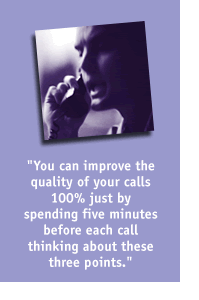
Developing Questions: Three Guidelines
| Ïðîäàæè | ||||
| Sales.com | ||||
| Questio... | ||||
by Stephen E. Heiman, Diane Sanchez with Tad Tuleja
 Asking
questions, learning to listen, getting information. Effective selling
is all about establishing a dialogue. It's about knowing what your customers
want, what they expect from your product and service, and what you can
do to fulfill their expectations.
Asking
questions, learning to listen, getting information. Effective selling
is all about establishing a dialogue. It's about knowing what your customers
want, what they expect from your product and service, and what you can
do to fulfill their expectations.
In a previous Sales.com article, we've outlined a proven Questioning Process. In that article, we highlight seven steps to getting the information you need to improve the relationship between you and your customers. If you haven't had a chance to read that article, please do. It explains why we believe in using a questioning process rather than using questioning techniques. It illustrates the difference between getting useful information as opposed to using a series of manipulative tricks designed to make statements sound like questions. Remember, an effective sales professional asks questions to help him or her better serve the customer. It's not a ploy to trick customers into a false sense of security, into thinking that you care more about them than you really do.
The
first order of business on every sales call should be to seek out the
information you need to better manage the call. But don't ask just any
questions. We recommend that you follow three criteria in developing questions
for an upcoming sales call. You can improve the quality of your calls
100 percent just by spending five minutes before each call thinking about
these three points. The questions you ask must:
Using these three simple guidelines, along with our Questioning Process, will help you find a better fit between your product or service and the customer's expectations. And that will help you close more sales.
From The New Strategic Selling by Stephen E. Heiman and Diane Sanchez with Tad Tuleja. © 1999 by Miller Heiman Inc. All rights reserved by permission of William Morrow & Co., Inc.